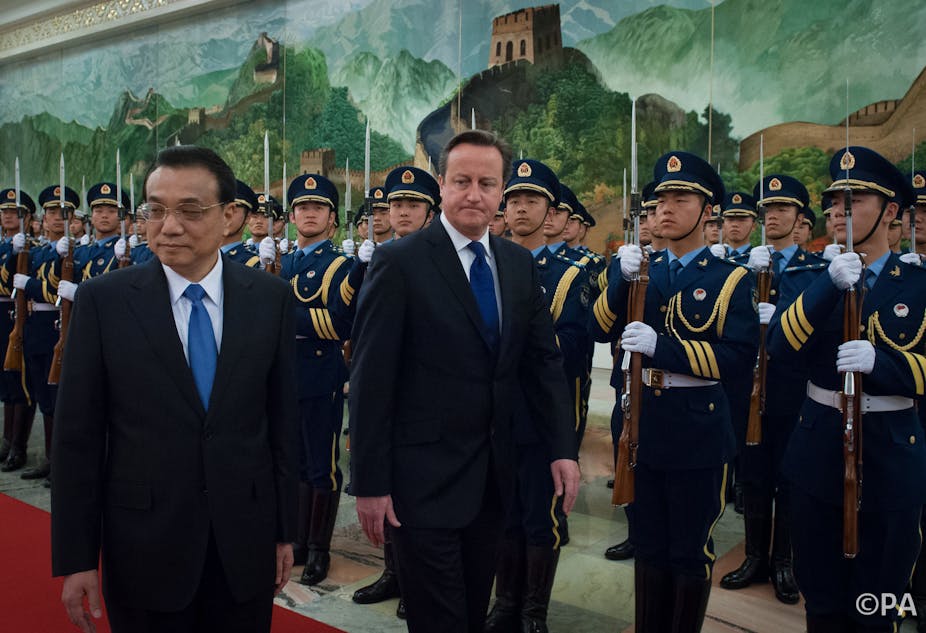It’s encouraging to see the UK government is finally taking China seriously as a business partner, with David Cameron this week following the parade of ministers who have made the trek to Beijing.
There are certainly huge business opportunities in the world’s second largest economy, still growing at over 7% each year – a growth rate well above the UK’s wildest dreams. But our politicians’ focus is far too narrow.
Drumming up more British exports is fine, and we surely need help here: exports to all of the BRIC countries (Brazil, Russia, India, China) reached US$24 billion in the year ended June 2013, but this was dwarfed by Germany’s US$139 billion and outpaced by France and Italy at US$38 and US$35 billion respectively, according to IMF figures.
We can also do more to encourage further Chinese investment into the UK and to attract a larger share of the money almost 100m Chinese tourists spend when they go abroad each year. However, there is a much bigger game out there that could really transform the UK’s global competitiveness.
Think global, act in China
As one CEO put it to me: “Thinking about winning in China is not thinking big enough.” We need to be thinking about how to harness the potential of China to help Britain win in the global market. To do this we must look beyond generating more exports and attracting inward investment.
The real prize to be gained is through joint innovation – enlisting the help of Chinese companies to turn the inventions, new technologies and ideas the UK has in abundance into competitive, mass-market products and services that can conquer the world’s markets.
This doesn’t mean just getting the Chinese to manufacture what we dream up. Instead, it will require us to collaborate on innovation and commercialisation: the processes of piloting, improving, and scaling up new technologies and developing complementary manufacturing methods to enable these new products to be made efficiently.
Historically Britain sold many of its inventions and new technologies to the US while they were still prototypes. Countless times we have seen American companies commercialise British ideas, turning them into mass-market blockbusters and reaping the bulk of the economic rewards. The US had advantages in doing this: it was the largest, most dynamic market in the world where consumers were hungry for what was new and improved.
Today the best place in the world to take a new invention or technology and turn it into a world-beating mass-market product is China. And the country is not only a huge new potential market but a very fluid and fast moving one. There are many first-time buyers and open-minded customers who are willing to try new things; looser planning laws and eager equipment suppliers mean it’s possible to get a new production facility up and running in months rather than years. It all adds up to less legacy of all kinds to get in the way.
Of course there are issues of intellectual property protection to overcome when companies work with Chinese counterparts to bring a new idea to the market. It’s necessary to get patents and trademarks in place, agree how the future markets and profits are to be shared with your Chinese partners, and breakdown your technology into what you need to share and what trade secrets can remain a proverbial “black box”.
But if you can overcome this hurdle, the upside of being able to use China to turn an invention or new technology into a large scale, value-for-money offering that can unlock the world’s mass-markets is simply immense.
Innovating together
Some companies, large and small, are already taking advantage of the potential of innovation and commercialisation alliances with China. Take the example of Green Biologics, a British company founded in 2003 to develop and commercialise a new technology for the production of renewable chemicals and biofuels. Green Biologics used alliances with Chinese giants such as Laihe Chemicals to take its technology from the laboratory to full-scale production facilities in a fraction of the time it would take in the UK. Once it had proven the scale-up in China, opportunities in Brazil and the USA opened up.
AstraZeneca, meanwhile, formed an alliance late last year with the Chinese company Pharmaron to help it progress new compounds through the innovation pipeline faster and get them to a scale that will deliver meaningful medicines to patients worldwide.
So the message to the PM is clear: if you want to improve the UK’s global competitiveness, raise your sights beyond export deals and inward investment projects. You need to be helping forge collaborative deals that enable us to rapidly commercialise British ideas and new technology, using Chinese resources and capabilities.
The new game for UK-China business links has to be about accelerating joint innovation to conquer world markets.

